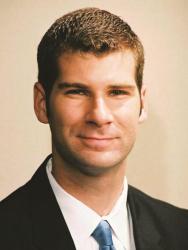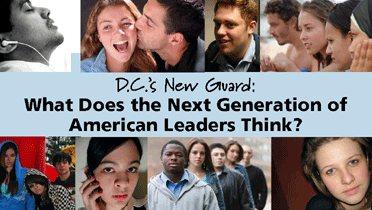In 2011, a “silver tsunami” will hit the United States: the oldest Baby Boomers will reach the United States’ legal retirement age of 65. As the Boomers leave the scene, a new generation will begin to take over. But while the generation that directly follows the Boomers, Generation X, may be “of age”, there is a good chance that it will not actually shape public life and leadership as much the following generation, the Echo Boomers, also known as the “Millennials.”
The Millennials are the generational cohort born from roughly 1980 to 2005, in an “echo” of the Boomer generation. But as with other generations, it’s not the exact date of birth that matters as much as their mindset and transformative experiences. The other names that the Millennials go by illustrate: Generation Y, the 9/11 Generation, the Facebook Generation, etc. Even prevailing popular culture neatly illustrates the difference. Which resonates more to you: the Beatles, Pearl Jam or High School Musical? How you answer is a pretty good indicator of which generation you belong to, not just because of differing musical taste, but because the symbolism that these three different types of music each evoke reveals the different mentality that Boomers, Gen X and the Millennials bring to the world.
The demographic power of the Millennials is far greater than many realize. This generational cohort is about 30% larger than the Baby Boomers in terms of raw numbers and three times the size of Generation X. Social and political changes ranging from the unlikely rise of Barack Obama in the 2008 election to the Facebook phenomenon evidence how this generation is just starting to flex its demographic muscles. As more and more Millennials come of age and then enter and advance in the workforce and electorate, they will have a political, economic and social weight not seen since the Baby Boomers and the indelible mark they left on American and global politics starting in the 1960s.
Recently, the corporate world has begun to realize that Millennials bring new issues and new challenges as well as new opportunities to the marketplace. Indeed, a multi-billion dollar industry of firms has already sprung up around how best to teach, lead and integrate this new generation into the workplace. Those corporations that succeed at both utilizing the talents of the generation as well as marketing towards them, like Google has done so far, will thrive. Those that fail will be like the RCAs or Kodaks of past generations.
But the foreign policy studies world has given little thought or examination to this rising generation, many of whom are just starting to advance through the ranks. We live in the era of White House staffers who have only operated in post 9/11 world politics, congressional staffers who think it normal to tweet during Senate hearings, and young military officers in Afghanistan who relax after a day of counterinsurgency by playing video games back at their Forward Operating Base. These youngsters will one day become National Security Advisors, Senate appropriators, and flag officers, who, as they rise in their careers, may face everything from the actual melting of the Arctic to a world in which China’s economy may surpass that of the United States.
But what do we actually know about the views and values of this rising generation of leaders? The answer is very little. Most studies ignore them and indeed, most polling tends to focus on overall population surveys, not delineating the next generation. Young leaders in specific garner even less attention. In fact, the current state of understanding is perhaps best captured by an article on Foreign Policy magazine’s website which asked: “How do Millennials Think About International Relations?” The article offered up several cogent hypotheses of events that might shape Millennial views (9/11, war in Iraq, etc.), but then left the question open, to be answered by individual Millennials in the website’s comments section.
It was to explore what these young leaders, who one day will be D.C.’s new guard, actually think that drove this project. This survey of attitudes of the next generation of leaders is not just fascinating in and of itself, but also could prove potentially useful in everything from voting pattern prediction and analysis to geopolitical forecasting. Indeed, a crucial flaw of so much of the literature about where the U.S. and the world is headed in the next few decades (written by authors like Thomas Freidman, Paul Krugman, Fareed Zakaria, Paul Kennedy, Thomas Barnett, Thomas Frank, Anne Coulter, Bernard and Jonah Goldberg, Hara Marano, Mark Steyn, etc.) is that the authors put themselves in that future, when it is actually the next generation, e.g. their research assistants, who will be running it.
The following study is significant for what it is, but also should be judged by what it is not. It is a look at a subset of young leaders’ identities and attitudes. It is not a survey of overall youth or general population attitudes, but rather only a set of youngsters who have been judged by their peers as having leadership qualities and have already demonstrated an interest in the world of policy and politics. To put it another way, it’s a survey of the type of kids who run for student government and choose to spend their summer vacations working in Washington. While we can’t be certain that this pool of over 1,000 young Americans definitively has a future president, senator, UN ambassador, or chairman of the Joint Chiefs in it (though it is important to note that a number of past and current presidents, ambassadors, generals, and senators would have been captured in similar studies at this very same point in their youth), it is a group composed of youth who already have the “Washington bug” and have set themselves towards a career in politics and policy.
It is a look at these young leaders’ attitudes towards key issues at a certain period, both in American history and their own lives. But the key issues at this time and their attitudes towards them are not set in stone. Indeed, the Baby Boomer experience illustrates how key issues, as well as attitudes, can change dramatically for a nation. A survey of young Baby Boomer leaders at this stage, for instance, likely would have focused on Vietnam and the Cold War on the foreign policy stage. The Boomers certainly shaped these issues, but the very same generation ended up dealing with Iraq, 9/11, and globalization, when they reached their heights of power. Notably, though, it was the formative experiences and attitudes forged in the era of Vietnam and the Cold War that continued to shape how Baby Boomer leaders (from Bill Clinton to George W. Bush) reacted to new issues and challenges.
The survey captures attitudes towards key areas of policy and geopolitics. It does not directly predict policy and geopolitics. Reacting to World War I and the Depression, the young generation of the 1920 and 30s, for example, would have shown very high levels of isolationism (something eerily repeated among this generation of youth). They certainly shaped an American foreign policy that reflected this isolationism. But in so doing, the resultant inward looking foreign policy didn’t handle well the emerging challenges of fascism, eventually leading to World War II and a reversal of policy that culminated with America’s rise as a global power.
In short, the following survey results shed light on the attitudes and values of an emerging generation of leaders at an important time in American and global history. Nothing more and nothing less. For that reason, we hope you’ll find the results like we find these kids. The best descriptor is perhaps one of the few slang words that means the same thing to Boomers, Gen Xers, and Millennials: cool.



